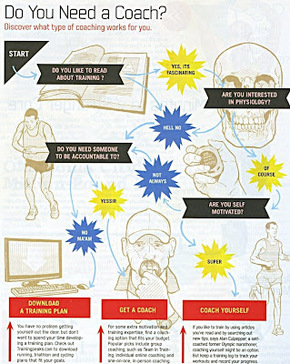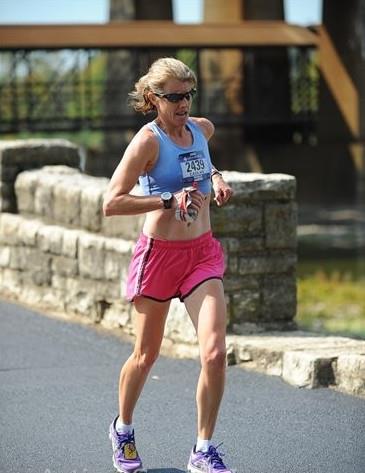“If you want to become the best runner you can be, start now. Don’t spend the rest of your life wondering if you can do it.” - Priscialla Welch, Olympian & NYC Marathon winner When I was in my 20s I saw myself as a fairly serious runner and road racer. Back then I usually placed in the top 3 of most of the regional races I entered, and I had big dreams - I ran sub-40 for 10k. By golly, that meant something (to me). But it never would have occurred to me to get a coach. I worked briefly with Andy Palmer in Maine, but for the most part I believed that coaching was only for the really really good runners and I never felt worthy. That was the 1980s and things have changed since then. Today all kinds of runners turn to coaches to help them for a variety of reasons and I, for one, see this as a good change. But of course I feel this way, suspicious readers might say while rolling their eyes at the transparent self-interest obviously at work here. After all, I'm now a coach, RRCA Certified (http://www.rrca.org/coaches/) and soon to be Lydiard Foundation (http://lydiardfoundation.org/) coach certified. Clearly I'm just trying to tell you all to train with me, give me gobs and gobs of money - make me rich and famous...Sorry, but that's not my purpose here. My purpose, instead, is to discuss the reasons why coaching may or may not enrich your running life, and to suggest that we each have own own answer to these two questions: Do I REALLY need a coach? and if so, What type of coaching (individual, in-person/online, running group, etc) would be best for me? There's lots and lots of running advice out there - books, videos, online training sites, Facebook running groups of all varieties, discussion boards, free training plans offered by everyone and anyone, and of course blogs, blogs...and so many more blogs. Some of the advice it good, and some, not so good. The challenge is sifting through it all and separating the wheat from the chaff. Let's face it, there's a lot we still don't know about pretty much everything in life.We know how to measure gravity, but do we really understand WHAT it is? And why is there something, rather than nothing? Where did everything come from? Where and how did everything begin? And we believe we know when we're dreaming or awake, but do we really KNOW the difference? Can I really PROVE I'm awake right now?... Sorry. Too much philosophy. Back to running... Knowledge is forever evolving as new understanding, evidence, and experience come to light. It's no different for running and training principles. What's best???: Barefoot or shod? Hard/easy or hard/hard/easy, or easy/easy/hard...? Run more or run less? How should I fuel before/during/after a long run/race? Am I drinking too much or too little? Electrolytes or no electrolytes? Trust my thirst or not? What shoes will fix X, Y, and Z-condition (fill in your injuries)? How long should a long run be? How long should I taper? What happens if I miss some runs? Then there's: Long runs (LSD) - How long and how slow? Intervals - How long and how fast and how many? Tempo runs: 5k pace, 10k pace, 15k-1/2 marathon pace...and for how long? Blahblahblah.. Marathon pace runs...progression runs...recovery runs...short hills...long hills...crosstraining...Ugg But we're not done yet. Now let's add in form: cadence, lean, arm swing, foot plant, push off...OMG! Make it stop. Here's a typical question directed to other runners: "Can anyone recommend a good 1/2 marathon (or marathon, etc) training program? I run about 15 miles per week and have run some 5k's and 10Ks." Some say to all this: JFR (Just F$%&ing Run!). It's as simple as that. And it may be. The self-coached runner, who has high aspirations and/or is taking on a new challenge, or the newer runner who doesn't have any experience with running, must have a pretty insatiable appetite for and curiosity about the ever changing information out there concerning training, nutrition, recovery, biomechanics, injury rehab...OR they can just download a program from one of the many well regarded and successfully used training plans, hope for the best and place their trust in what seems to work for so many others. And that will probably work for you if you are self motivated - driven - disciplined... There's literally gobs of decent cookie-cutter programs out there. Try one that sounds good. It will probably get you to the finish line, and you may learn a thing or two along the way. The question is: Is what you're doing working for you? And this question is important whether you are self-coached or if you currently have a coach. Are you happy with how you're progressing? Have you plateaued? Are you feeling confused about how and what to change in your training? Do you have zero interest in trying to understand everything and you just want to run or do you love reading books, and articles about training? Do you need (or does it help) to be accountable to someone else? Do you need/want others to run with? All these questions are very personal, and they will determine whether a coach, and what sort of coach, might work best for you. One thing's for sure: It's no longer just elites, or aspiring elites, looking for good coaching that suits their individual needs to help them reach their personal goals no matter what those goals may be. "For me, running is a lifestyle and an art. I’m far more interested in the magic of it than the mechanics.” ~ Lorraine Moller, Olympic Marathoner and Bronze Medalist.
0 Comments
Leave a Reply. |
Chronic Runner
|


 RSS Feed
RSS Feed
